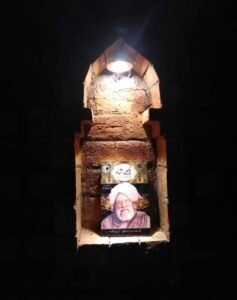Some spaces, things and ideas are very close to our hearts. Though some part of them is on the ground rest is in our mind and soul. “Chaupal” is one of them. A common space owned by the people of the village.
A place where people regardless of their faith, gender, colour, and cast would sit together and discuss the serious and non-serious matters of the village. To maintain communal harmony and to ensure justice the elders and panches solved the problems of the villagers.
In the Maithili language, a Chaupal is also called ‘Chaupari’ meaning a sacred place with the magical ability to solve issues or cure diseases by sharing happiness, sorrows and sufferings with each other. People of the village were associated with this place not only socially but culturally and emotionally as well.
Looking into the history of Chaupal, Mahatma Gandhi was a great supporter of the concept of Chaupal. His Gramaswaraj and Hindswarj are in fact rooted in the concept of Chaupal.
The most valuable component of Mahatma Gandhi’s vision of future India in which economic and political power would be decentralized on the grassroots level and each village would be self-sufficient and self-reliant economically. He always wanted to empower local bodies. Molly Kaushal in his book Folklore, public sphere and civil society quotes Gandhi’s remarks that “if a village perishes, India will perish too”. Because most of the economy at that time derived capital through village products.
Other than socio-cultural issues people also discussed the matters in Chaupal that would make them economically strong and independent. In the wider sense, Chaupal played a diverse role in the economy, Indian judiciary (Lok Adalat), Literature, Politics and Language. What could be more beautiful than Brahmins and Shudras sitting together under a single roof of Chaupal.
Then came the era of colonizers. They changed the picture of Chaupal into individual Dera, Baithak, and Haveli. With no place for discussion on social affairs people got dispersed into casts, classes and faiths. The East India Company in 1857 destroyed the Panchayat (the heart of Chaupal) and replaced it with the office of Diwan in 1765 in Bengal.
The company then introduced other management institutions. The first creation of the company was called Patwari and the second Magistrate. Either of them did not serve the all-inclusive nature of Chaupal. Hence, the socio-cultural fabric of villages was ripped apart. It gave power to colonial servants; Patwari and Magistrate who only acted at the will of colonial authorities. With no such immediate authority to overlook the social matters, anarchy prevailed and killings on the basis of religion, caste and color became commonplace.
Today when we see the situation of Pakistani villages it depicts the picture of the colonizer’s dream come true that people fighting with each other on differences of language, color, gender and religion. But simultaneously there are some people who are struggling to revive their forgotten culture, to revive the concept of Chaupal and Panchayat.
They have realized that seven decades of self-depreciation has not helped society to be progressive and pluralistic. So, they have built a safer space named Aman Chupal in a village Sanda Kalan of district Kasur to ensure acceptance and inclusion of religious minorities, promotion of diversity, and furtherance of coexistence. It is working to provide opportunities especially to females, youth and children to interact with people from other religions, sects and casts.

The writer Holds an honors and Mphil Degree in English language and language. She has recently co-founded “Aman Chaupal” a safer and inclusive space for villages particularly children and females to intermingle and interact. Hailing from a remote village of Bulleh Shah’s land kasur, zealous to preserve, promote and popularize her mother tongue Punjabi.

